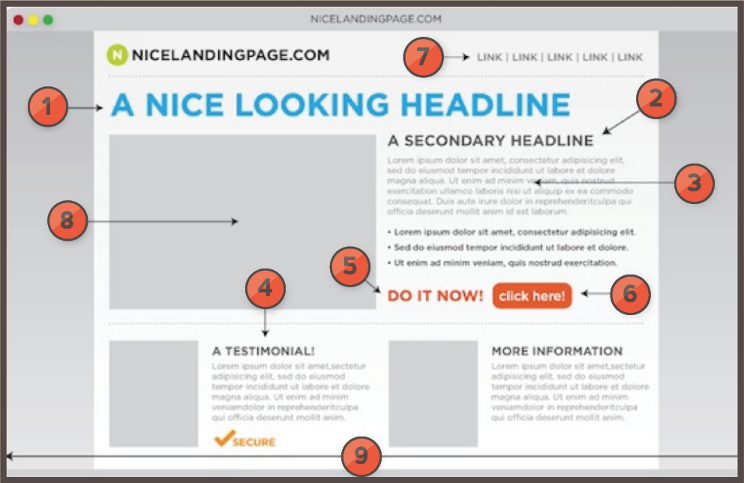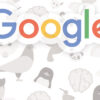You get only 2 seconds to convince your visitors about your relevance. If you fail, the visitor clicks the back button and leave your site for good. Here’s how you can stop it.
According to Neil Patel, landing pages are like signposts that direct buyers at each stage to take that next all-important step.
Very true!
Creating a landing page is all about putting yourself into the prospective customer’s shoes and thinking the way they do. As a landing page designer, you need to correctly anticipate the expectations of a potential customer when they arrive at your landing page. It’s the only right way to build each element of your landing page so your visitor will find exactly what you have promised him before he landed on your page.
So, let’s take a look at the nine most conversion-critical elements that all successful landing pages have in common.

Compelling Headline
This is the first thing your prospective customers can see as soon as they reach your landing page. You had better make it compellingly relevant enough for the visitors. Make sure it is consistent with the message in your Ad headline which was created as a link-bait for the customer.
If the headline in your Ad says, “Coffee Table under $200”, the landing page headline should carry a similar message. With a consistent message, it lives up to the promises made to the visitors when they click on your Ad.
Secondary Headline
The secondary headline is meant to compel and appeal to the visitor’s worries, anxiety or issue upfront. So, make sure you empathize with the visitors’ needs when they follow your landing page. For example, you can say, “A Great Coffee Table You Can Actually Afford”.
Perfect Grammar
You can’t afford to make mistakes on a landing page as this is a trust-sensitive page. You’re a stranger to the visitor and he might be approaching you cautiously and skeptically. With poor grammar or spelling mistakes, it’s going to hurt your credibility and create an impression that the site is not trustworthy. So be very careful while writing content for your landing page.
Customer Testimonial
Customer testimonial is one of the many trust signals you should use on your landing page to generate confidence and trust in your visitor’s mind. The visitor, as mentioned previously, is approaching you cautiously – he wants to figure out if your company is worth doing business with. Therefore, trust signals such as a customer testimonial or security seal can go a long way in instilling confidence in visitors’ mind.
Strong Call-to-Action
Call-to-Actions can motivate your visitors to act and take a positive action on your site. Your language for call-to-action should be strong, promising and assertive. More importantly, you should use ‘active verbs’ such as Download, Get and Create in your call-to-action to make them seem more appealing to your visitors. According to KissMetrics, words such as Free, Trust, Fair Price, Caring and Quality can secure visitors’ trust in your business.
Enticing Button
The buttons supporting your call-to-actions should be visually appealing to the visitors. They should have a unique color which is different from the rest of the color scheme used on your page. It helps to make them stand out and be noticed.
Focused CTA
Having too many links on a landing page can dilute its very purpose and lead to lower conversion. The main purpose of a landing page is to move the visitors through the call-to-action as soon as possible. Having a bunch of other links that are not tied directly to the landing page can distract your visitors and lead poor conversion as well.
Images/Videos
Adding images or explainer videos can help your prospective customer get the message quickly and take a positive action. Make sure the images or videos explain the basics and benefits of your product or service in a way that bolster the message.
Above the Fold
Put the important message above the fold, i.e., the page area that appears to the visitors when they haven’t started scrolling down the page. However, consider the usability factor while putting the information above the fold. Do not jam every piece of content above the fold. For above the fold best practices, read this post.
The rules for the perfect landing page can change with various factors such as the product, service, devices, technology and more. However, all of the above points remain important to any landing page regardless of the evolving factors.
Hope this post helps you build a great landing page for your website. Let me know your thoughts in the comment box below.













The substance you have added in your expression is professionally credible as far as content writing is concerned the noteworthy aspect however is to anticipate the visitor’s need on the landing page must be unquestionably taken care to keep his eye sticked up with the text.
Thanks for sharing your thoughts! I completely agree with you!
Hi Susanta ,
Thanks for sharing such a nice and informative article with us. I think “Customer Testimonial” is very good suggestion for me. This is very great way to grab attention of others. I will definitely work on this.
I’m glad you like the article. Thanks for stopping by!